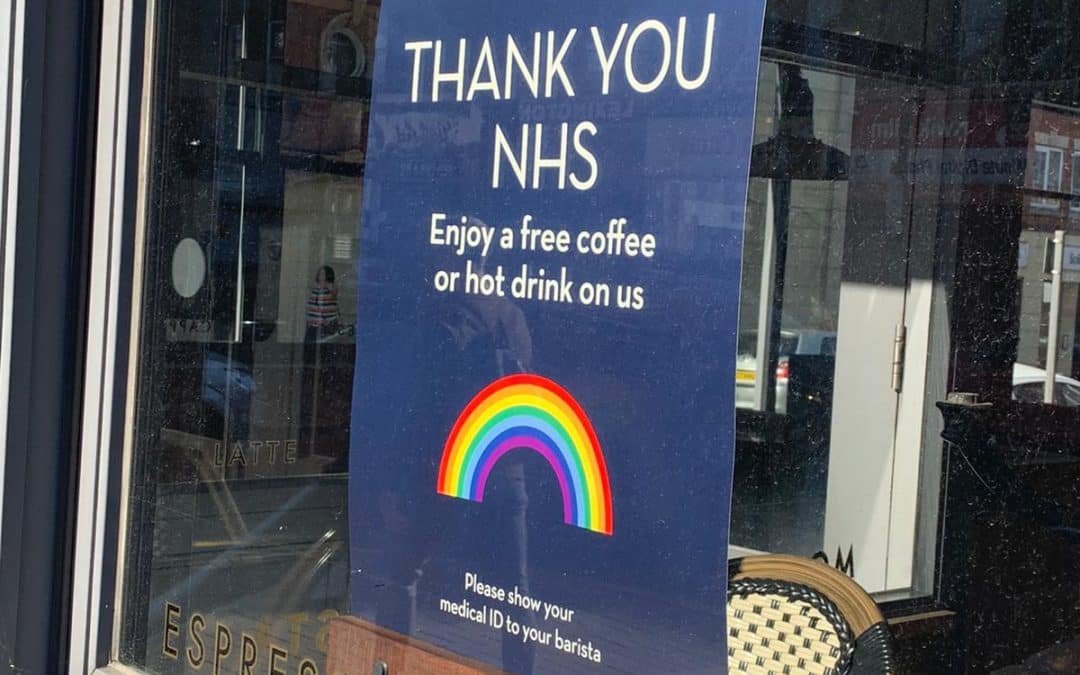Take a walk through the shuttered restaurants and shops of Britain, and you will feel that you are being ignored by old friends. Whether it’s a café you used to regularly meet people in, or a clothes shop that always seemed to have the right outfit for every occasion and a diplomatic assistant to help you get into it, we are no longer interacting with many businesses in a way we took for granted a few short months ago.
Businesses are in a very difficult position right now. They are cut off from the customers and yet they also have to do what they can to survive. And while we all look forward to the day that this is over, it seems unlikely there will be a swift return to how things were. It will be a long slow road back. Businesses need to ensure that they are continuing the relationship they have with the customer when the primary means of that relationship – the everyday business of doing business – is no longer happening.
The silver lining is that communication has never been easier with widespread use of social media and digital platforms. The difficulty is that although it’s easy to get your message out there, it can be very difficult to make it stand out when everybody else is trying to share the same space. What can businesses do to make the communications matter? Messages must be clear, relevant, useful, timely, and sensitive. They also need to be authentic, and this may actually be an opportunity for your business to show what it’s really made of.
So, here are six strategies for businesses trying to communicate with their customers and the media in this crisis…
1. Think of the people
Human centred stories are doing well right now. Think of Major Tom, whose story raised millions for the NHS. He had it all:
- Raising money for the NHS
- Ex services – a war hero
- 100 years old
- Setting – and smashing – a challenging target
Look into your organisation. Is there an informal support network such as a food drop or an online social meeting that could benefit from your support as a business leader? Most companies do things like match charitable giving for their employees – you may be able to think laterally and do something else at this time, by allowing use of meeting software or other business infrastructure that would otherwise go unused. A story about teaming up and helping others also generates positive news stories, such as this example of free driving lessons being given to key workers. These initiatives don’t just help your reputation with the public; they also have the benefit of making others in your company proud of working for you.
Think about who your customers are, and what is their major concern. With the sudden need for parents to oversee their children’s education at home, one online revision platform made themselves heroes to families everywhere by creating free-to-use revision materials.
2. Link to the current crisis
If your business is doing something to help, highlight this. If, for example, you are a shop, you may wish to look at your website to ensure that it is user-friendly and up to date. If most of your customers are local, there is an appetite for people to support businesses near them. Many restaurants and cafes are keeping afloat by running a takeaway service which allows people to order through a website and collect their order at a designated time.
Some non-essential businesses are boosting their online capabilities – we have seen many retailers switch from just having a presence on the High Street to finally embracing omnipresent e-retail to boost their coffers.
Where this isn’t viable, such as at open-air markets, steps have been conspicuously taken to make the shopping experience as safe as possible, including foot operated sanitisers.
You may be working to a higher goal, for example, changing your factory to make PPE for NHS frontline workers. This on the face of it is a fantastic good new story. Beware however, that it can backfire, particularly if you are not the right business to be involved. Not every pharma company has vaccine expertise, so there is no point in every pharma company working on a vaccine. At the beginning of the outbreak, British manufacturer Dyson made a big noise about providing ventilators for the NHS. Existing ventilator manufacturers were ignored. This is obviously not a brilliant story for Dyson, particularly as many of their other products are highly regarded. However helpful they thought they were, they have since abandoned their offer to make ventilators as they are ‘mercifully not now required in the UK’.
Good Corporate Social Responsibility (CSR) is nothing new, and this crisis is an opportunity to do the right thing. Whether that is a big project working with the government or the NHS, or whether it is simply helping out a local community group. Think imaginatively about ways in which you can bring the resources of your business to work for the greater good.
There are plenty of examples of supermarkets giving key workers dedicated opening hours; taxi companies giving free rides to NHS staff; even software companies making their services available and broadband providers giving free and unlimited data to NHS workers.
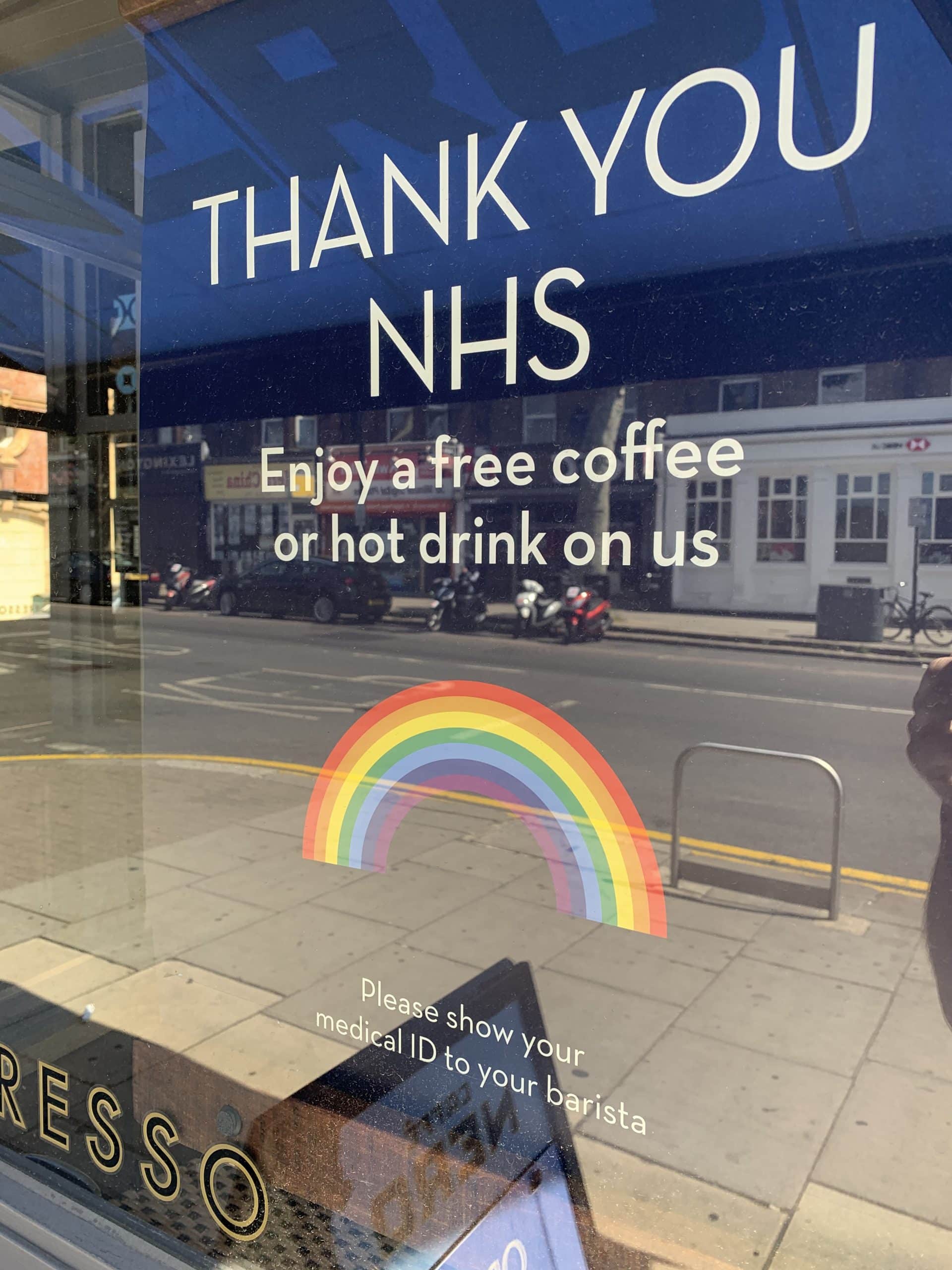
Caffè Nero: free coffee to the NHS – making small gestures like this can show that you support the work of the NHS and create both a sense that you are doing the right thing as a business and make other customers feel good about using your product or service.
The NHS, by being on the front line and dealing with the fallout of the epidemic, has effectively become the biggest brand in the UK right now, and people have a real sense of affection for it (think of all those rainbows in windows and on pavements). Businesses have an opportunity to provide real support to NHS workers which generates goodwill and positive news.
As well as doing the right thing, some businesses are using marketing messages that show how they are helping others do the right thing too…
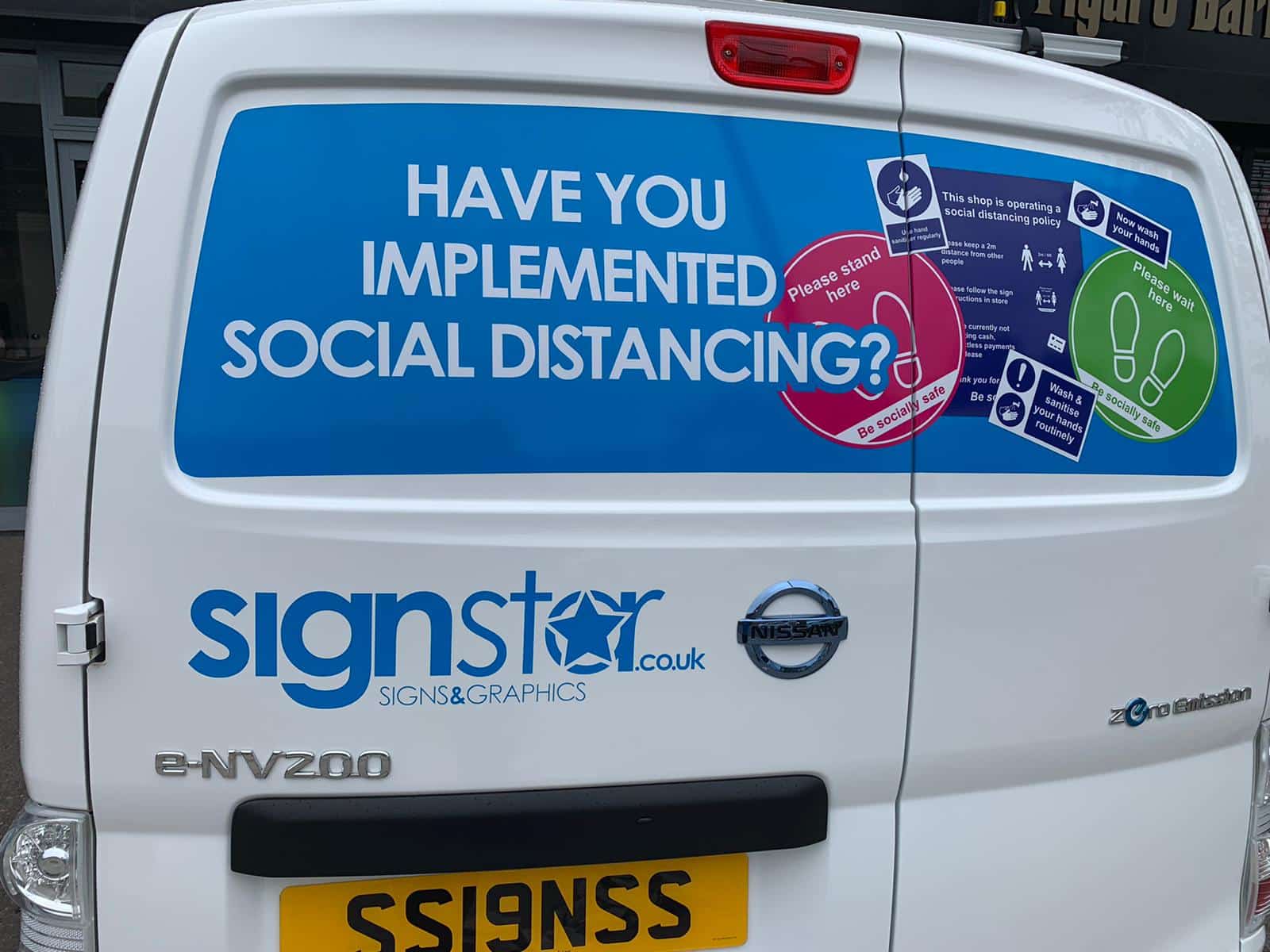
3. Be a good news story
There is also a sense that people don’t want to read exclusively about the Coronavirus. If you can find an angle that avoids the pandemic, the shutdown and associated stories, you may have something that will capture more hearts and minds purely by being something different.
In times of doom and gloom people want to be uplifted by good news. Forget the old saying that ‘if it bleeds it leads’ – but people really don’t have the appetite for that right now: they would much rather look at a newly-hatched Osprey chick.
They also want a return to normality which is entirely understandable. Some businesses have made a splash by adapting what they do to give people a taste of their product (literally for restaurants that have pivoted into takeaway outlets) or service (such as drive-in cinemas and nightclubs).
What you must ensure is that you do not pretend that everything is as it was before. There is a real need for businesses to be seen as being responsible about how and when they reopen. Businesses are also judged on fairness when it comes to their employee engagement strategies – using the crisis to lay off staff or forcing through a pay cut is the sort of behaviour that kindles a sense of unfairness. By contrast, those that are going above and beyond to support their people such as Timpson who are topping up the government furlough to pay workers a full 100% of their salary are emerging as heroes of the lockdown. But then again Timpson have always led the way of thinking differently when it comes to looking after their employees by listening and acting on information from the customer-facing front line – an approach that some airline bosses would benefit from.
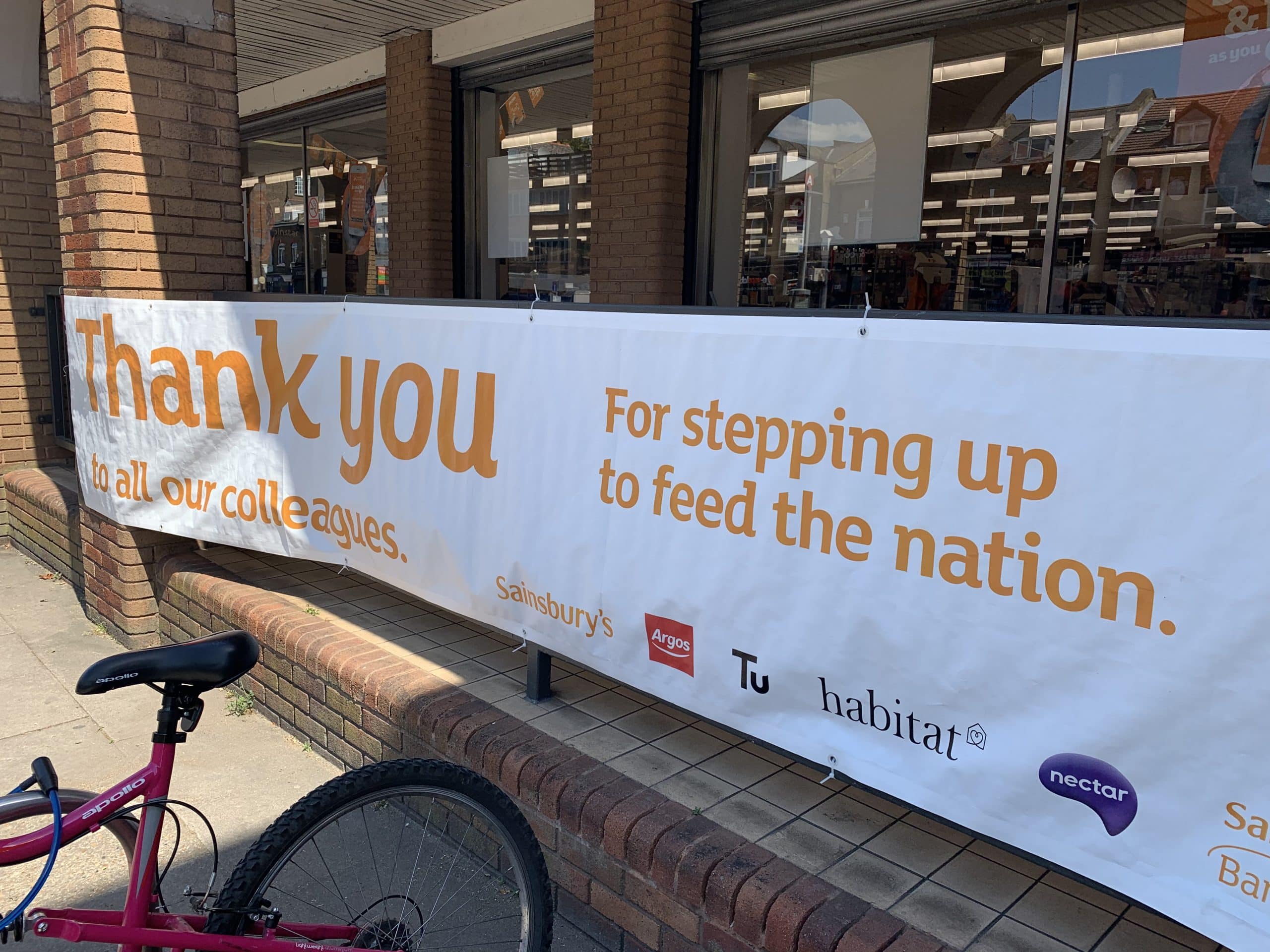 Sainsbury’s: ‘Thank you – For stepping up to feed the nation’ – the Coronavirus Crisis has made us see people who keep the shelves full in a new light. Supermarkets have become flashpoints for fights over supplies and have the potential to become vectors for disease. When management shows respect with a ‘thank you’, the customers show it too.
Sainsbury’s: ‘Thank you – For stepping up to feed the nation’ – the Coronavirus Crisis has made us see people who keep the shelves full in a new light. Supermarkets have become flashpoints for fights over supplies and have the potential to become vectors for disease. When management shows respect with a ‘thank you’, the customers show it too.
4. But don’t be out of step
Right now, communities are feeling under siege. Community Facebook groups and offers of help have sprung up during the lockdown. With this sense of community forefront, it would be a mistake to denigrate it, or go against it.
Under normal circumstances, a disruptive marketing campaign can make a brand look maverick and independent. But being out of step with medical advice or common sense can damage your reputation – and just as good news stories spread, people are also happy to share lists of businesses they believe deserve to be boycotted for behaviour seen as unacceptable.
JD Wetherspoon’s Founder Tim Martin has a long history of courting controversy. Martin’s message to its workers to find new jobs at the beginning of the outbreak, and his vocal haste to re-open his pub chain when it may not be safe to do so, arguably doesn’t serve them well as a brand. Compare and contrast with the Timpson’s example mentioned above.
Check your messaging carefully, as a misplaced word could give the wrong impression and be impossible to unpick. Companies need to beware of their messaging, that it isn’t going to be misread as ‘back to normal’ because for many people it isn’t.
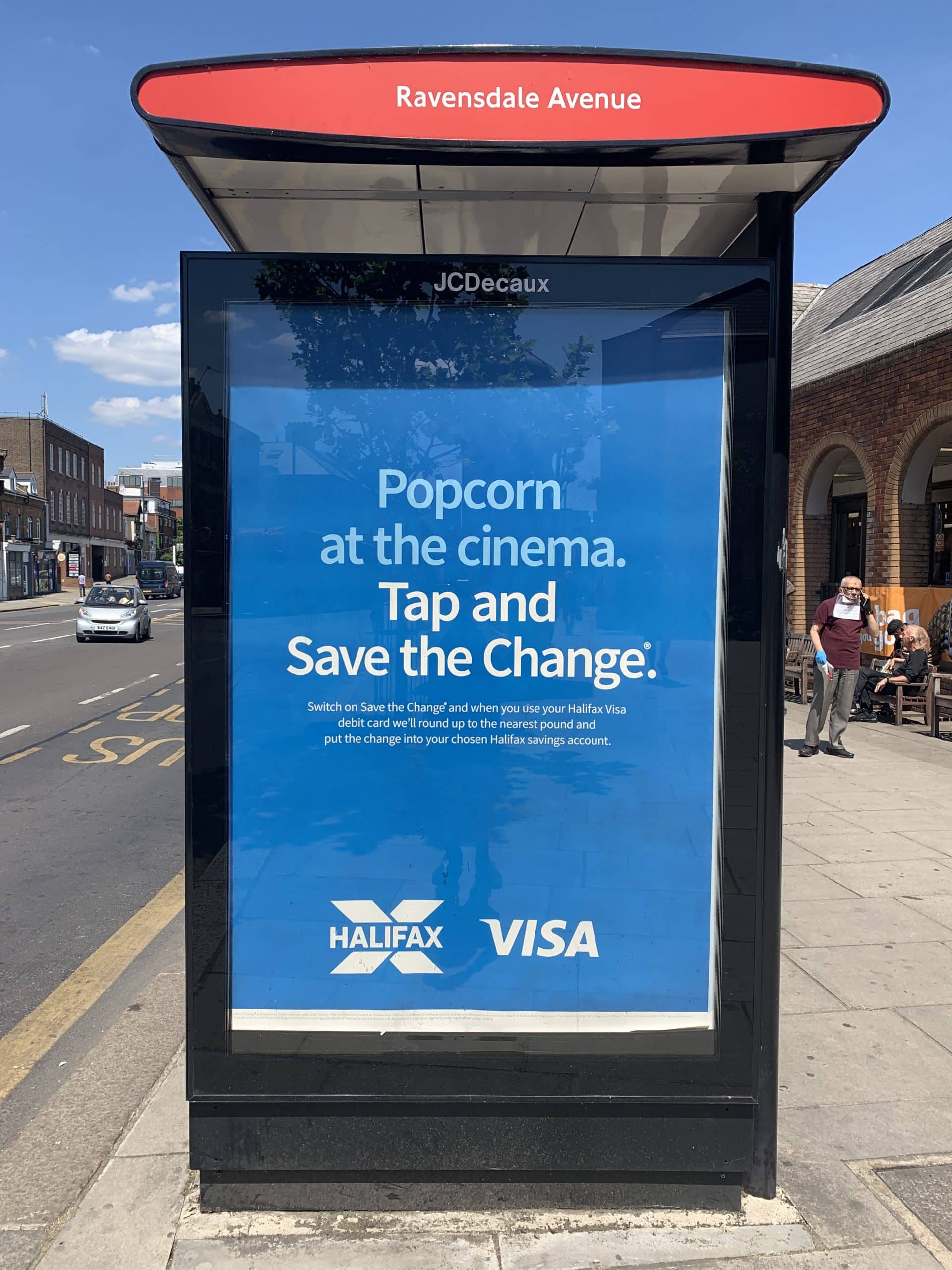 Out of date ‘advertising street furniture’ or bus stop advertising to you and me. You should try to keep your messages relevant – as many cinema chains closed on 17th March, this message feels very out of step with life under lockdown.
Out of date ‘advertising street furniture’ or bus stop advertising to you and me. You should try to keep your messages relevant – as many cinema chains closed on 17th March, this message feels very out of step with life under lockdown.
5. Go against the grain (maybe)
If you had to describe how to script a generic advert for the lockdown, it would probably go like this:
- Buy the rights to the best-known song you can afford (ideally in a minor key)
- Get members of the public/your staff to play it on a Zoom call
- Edit them together so that it has a nice build, e.g. start with someone singing alone, then had a guitar, drums
- Put in a thank you message to the NHS, and a rainbow
We have seen loads of these, and although we have no problem with thanking the NHS, these are pretty generic adverts and until the logo comes up, it’s hard to say what product or brand it is pushing.
One of the big trends in 2020 has been home-made videos by businesses and we will see a lot more of this even as lockdown ends. Expect to see a hot take on business news from your favourite CEO’s desk or front room, spoken into a handheld camera phone.
Going against the grain is pretty straightforward: you just take what everybody else is doing and go in the opposite direction. If everybody is doing adverts on Zoom…do whatever you can to have bigger production values. If others are using members of the public – think about using your staff. If you hear a cliché, go against it. Tell the truth. Let people know that you think independently. The outcome may be deeper customer loyalty, even though it may lose you a few customers along the way.
Of course, this can be a high-risk strategy, see point 3 for a health warning. It’s okay to go against the grain, so long as you’re telling a deeper truth. Don’t just go against the grain to be controversial for its own sake.
6. Beware adding to bad news
Things like the environment and Brexit negotiations continue to be issues that haven’t gone away just because the world has suspended business as normal, but there is a limit to how much bad news the average member of the public is willing to take.
Unless you can add a positive spin (‘Company signs major deal with foreign company for post-Brexit trade’) you’re in danger of adding to people’s worries and they will turn off.
The Woodland Trust is one organisation that has managed to strike a very good balance of protecting the woodland, and the people who use it; providing education for people who cannot get outside to experience it; and to give reassurance that their work is ongoing throughout this crisis, and the woods are being looked after for when lockdown is over.
You don’t want to appear to be a Pollyanna (finding the good in everything) so be very careful of how you make bad news into good news.
At this time, we are all seeing one another in a different light. Under duress, we find out how they (and we) behave under pressure. Businesses are under scrutiny, and customers are asking: are they behaving well? Badly? Somewhere in the middle?
Businesses have an opportunity to show that they are worth supporting when lockdown is over. Those that do the right thing now, will build goodwill and positive news stories that will serve them well in the coming months. Those that behave badly may see their reputation permanently tarnished. None of this is easy, these are not easy times. But they are possible. And they are choices that as a business leader you have to make.
This article appears on Nadine Dereza’s website as well as PS Programmes.

